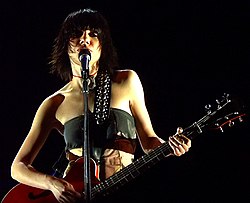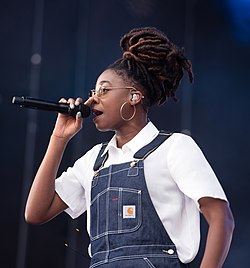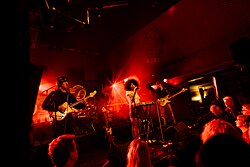Any album released by a British or Irish artist, or by a band where over 50% of the members are British or Irish, may be submitted for consideration by their record label. There is a fee for submission. Twelve submitted albums are shortlisted for the prize, chosen based solely on their musical merit and irrespective of how popular or successful an album or act that has been submitted may have been in the previous calendar year. The shortlist is chosen by an independent panel of musicians, music presenters, music producers, music journalists, festival organisers, and other figures in the music industry in the UK and Ireland. [1] [2] [3]
The prize is open to all types of music, including pop, rock, folk, urban, grime, dance, jazz, blues, electronica and classical. Presentation of the awards usually takes place at an Awards Show in October, after the shortlist is announced at the Album of the Year Launch in September. It is often observed that bands whose albums are shortlisted, or win the prize, experience a large increase in album sales, particularly for lesser known acts. [4] Each shortlisted artist receives a specially commissioned 'Albums of the Year' trophy at the Awards Show. Unlike some other music awards, the overall winner of the Mercury Prize also receives a cheque for £25,000. The winner also receives an additional winner's trophy. [1]
History
The prize was originally sponsored by Mercury Communications, a brand owned by Cable & Wireless, [5] from which the prize gets its name. It was later sponsored by Technics [6] (1998 to 2001), Panasonic [5] (2002 and 2003), Nationwide Building Society (2004 to 2008) and Barclaycard (2009–14). [7] The 2015 prize was sponsored by the BBC, while in 2016 it was announced that a three-year deal had been struck with Hyundai to sponsor the event. [9] It was sponsored by Free Now, as part of a multi-year deal that began in 2022. [10] In 2024, the award lost their deal with Freenow, prompting the cancellation of the ceremony and live performances for that year. [11] In 2025 it was announced that the ceremony would take place in Newcastle, the first time it would be outside London. [12]
To date, PJ Harvey is the only artist to have won the award on more than one occasion (in 2001 and 2011). She was also the first female solo artist to receive the award. Alex Turner has received six nominations, five as a member of Arctic Monkeys and one with The Last Shadow Puppets, winning once. Thom Yorke has six nominations, five with Radiohead and one for The Eraser , but has never won. [13]
The awards ceremony was postponed for the first, and so far only, time in 2022 following the death of Queen Elizabeth II. [14]
Reputation
The Mercury Prize can have a considerable effect on sales for those artists who are shortlisted. Elbow saw a 700% sales increase of their album The Seldom Seen Kid after winning the Prize in 2008. [15] In their winner's speech, Elbow's frontman Guy Garvey said that winning the Mercury Prize was "quite literally the best thing that has ever happened to us". [16] [17] Similarly, sales of The xx's winning album rose by 450% the day after they won the 2010 Mercury Prize [18] [19] and 2013 winner James Blake saw a 2,500% sales increase on Amazon after he was announced as the winner of the 2013 Mercury Prize. [20] [21] 2011 winner PJ Harvey's album Let England Shake jumped from number 181 to 24 in the UK official charts the week after the 2011 Awards Show. [22]
Despite being regarded by many as highly prestigious, it has been suggested that having an album nominated for or winning the Mercury Prize could be a curse on a career in music. [23] [24]
In 2001, the band Gorillaz requested that their eponymous debut album be withdrawn from the shortlist, with cartoon bassist Murdoc Niccals saying that winning the award would be "like carrying a dead albatross round your neck for eternity". [25] [26]
All genres of music are eligible for entry, and it is stated that all are treated equally, with only the music on the album being taken into account. [1] Simon Frith, chair of the Mercury Prize judging panel, has said that albums are chosen because they are the "strongest" each year, rather than according to genre. [27] However, the presence of classical, folk and jazz recordings has been cited by some as anomalous, arguing that comparisons with the other nominees can be invidious. [28] Classical acts to have an album nominated have included John Tavener, Peter Maxwell Davies, Gavin Bryars and Nicholas Maw. None has ever won, and there has not been a shortlisted classical album since 2002.
The Mercury Prize also has a reputation for being awarded to outside chances rather than the favourites. [29] [30] The 1994 award winner was Elegant Slumming by the pop act M People, which some felt was a controversial decision considering the shortlist included popular albums from Britpop figureheads Paul Weller, Blur and Pulp, and electronica band The Prodigy. [31] [32] [33]
Other music journalists critical of the awards stated that the 2005 award should not have been given to Antony and the Johnsons for their album I Am a Bird Now as, although they are British-born and therefore eligible for the Prize, the band was based in the United States. [34] [35] In 2006, Isobel Campbell's collaboration with Mark Lanegan, Ballad of the Broken Seas , was included in the shortlist, despite Lanegan being American, as the album was eligible due to Campbell's British citizenship, while Guillemots, whose album was also shortlisted in 2006, contained band members from Brazil and Canada, although the majority were from the United Kingdom. [36]
In 2020, pop musician Rina Sawayama decried the Mercury Prize rules, which stated that only British and Irish citizens would be eligible for the Prize. Sawayama holds a Japanese passport, a country that prohibits dual citizenship, and was not eligible for her 2020 album SAWAYAMA , despite having living in the United Kingdom for 25 years. [7] This prompted a change in the eligibility criteria for both the Mercury Prize and the BRIT Awards in 2021, and under the new rules, artists who “have been permanently resident in the UK or Ireland for more than five years” qualify for the Mercury Prize. [12] [13]
Current eligibility criteria state that all albums must be available to buy as a digital release in the UK. [1] In September 2013, My Bloody Valentine vocalist and guitarist Kevin Shields expressed concerns about the award in an interview with The Guardian , accusing the Mercury Prize's organisers of "banning" the band's self-released album, m b v , from the shortlist nominations and addressing the nomination criteria, which he claimed branded the album "virtually illegal". [37]
It has been noted that heavy metal has been overlooked by the prize. A 2013 article by Vice on the Mercury Prize said "Metal certainly never gets a look-in, not even on the official entry information form: 'The Prize is open to all types of music, including pop, rock, folk, hip-hop, R'n'B, dance, soul, jazz, blues, electronica, classical…'" [38] The only metal record that has ever been nominated for the Mercury Prize is Troublegum by Therapy? in 1994. In 2011, Mercury chair of judges Frith said "[Metal] is a niche that a lot of people don't listen to." [39] In 2011, The Guardian music critic Alexis Petridis agreed that the Mercury Prize underrepresented heavy metal, but argued that this actually benefitted the genre because "At least part of metal's appeal is its outsider status." [40]
The 2024 Prize was the first time in its history that the show did not have a live audience, due to the award's failure to attract a sponsor. [41]
When English Teacher won the award in 2024, they became the first winner from outside of London since Young Fathers in 2014. [42] [43]


































